六种英语时态
- 格式:docx
- 大小:21.93 KB
- 文档页数:4
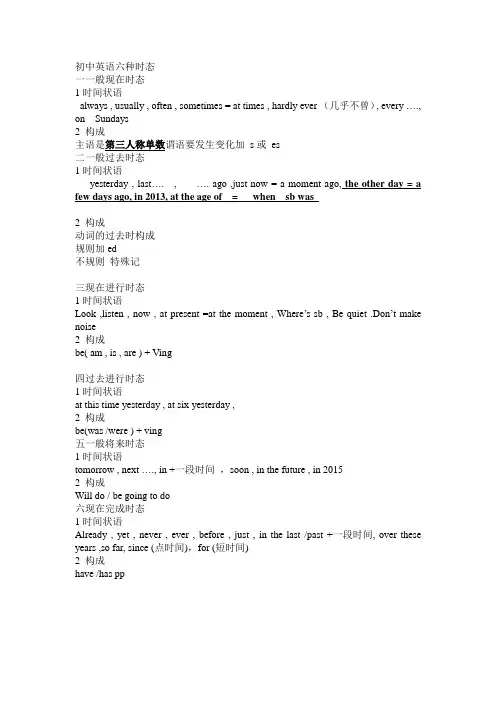
初中英语六种时态一一般现在时态1时间状语always , usually , often , sometimes = at times , hardly ever (几乎不曾), every …., on Sundays2 构成主语是第三人称单数谓语要发生变化加s或es二一般过去时态1时间状语yesterday , last…. , …. ago ,just now = a moment ago, the other day = a few days ago, in 2013, at the age of = when sb was2 构成动词的过去时构成规则加ed不规则特殊记三现在进行时态1时间状语Look ,listen , now , at present =at the moment , Where’s sb , Be quiet .Don’t make noise2 构成be( am , is , are ) + Ving四过去进行时态1时间状语at this time yesterday , at six yesterday ,2 构成be(was /were ) + ving五一般将来时态1时间状语tomorrow , next …., in +一段时间,soon , in the future , in 20152 构成Will do / be going to do六现在完成时态1时间状语Already , yet , never , ever , before , just , in the last /past +一段时间, over these years ,so far, since (点时间),for (短时间)2 构成have /has pp注意一时间状语1just现在完成时态just now = a moment ago 一般过去时态2 in the past /last 一般过去时态in a few years 一般将来时态in the last /past few years 现在完成时态3 the other day = a few years ago一般过去时态4 over (these) years现在完成时态5soon 一般将来时态6 at the age of = when sb was 一般过去时态7 so far =by now =until now 现在完成时态8 snice then现在完成时态Until then 过去完成时态二延续与非延续For /since 后面跟延续性词非延续词有完成时态I have bought a book .我买了一本书。
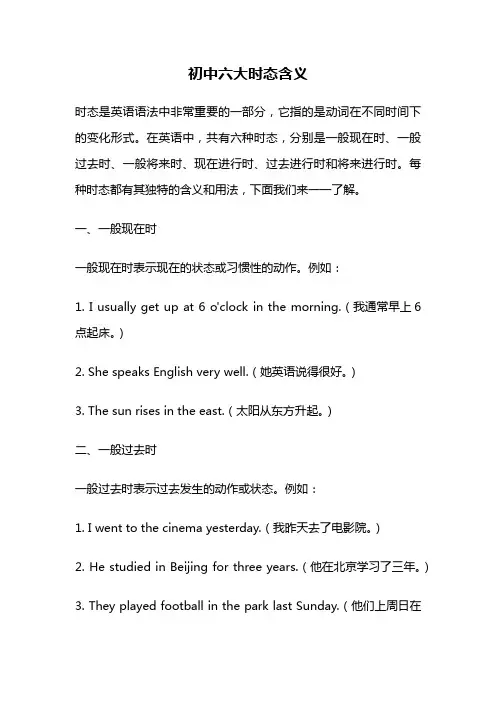
初中六大时态含义时态是英语语法中非常重要的一部分,它指的是动词在不同时间下的变化形式。
在英语中,共有六种时态,分别是一般现在时、一般过去时、一般将来时、现在进行时、过去进行时和将来进行时。
每种时态都有其独特的含义和用法,下面我们来一一了解。
一、一般现在时一般现在时表示现在的状态或习惯性的动作。
例如:1. I usually get up at 6 o'clock in the morning.(我通常早上6点起床。
)2. She speaks English very well.(她英语说得很好。
)3. The sun rises in the east.(太阳从东方升起。
)二、一般过去时一般过去时表示过去发生的动作或状态。
例如:1. I went to the cinema yesterday.(我昨天去了电影院。
)2. He studied in Beijing for three years.(他在北京学习了三年。
)3. They played football in the park last Sunday.(他们上周日在公园踢足球。
)三、一般将来时一般将来时表示将来要发生的动作或状态。
例如:1. I will go to the beach next weekend.(我下个周末去海滩。
)2. She is going to study abroad next year.(她明年要出国留学。
)3. They will have a party on Friday night.(他们周五晚上要开派对。
)四、现在进行时现在进行时表示正在进行的动作。
例如:1. I am writing an article now.(我现在正在写一篇文章。
)2. She is watching TV at home.(她正在家里看电视。
)3. They are playing basketball in the playground.(他们正在操场上打篮球。

关于英语的八种时态一、现在进行时二、将来时三、一般现在时四、一般过去时五、现在完成时六、一般将来时七、过去进行时八、过去完成时一、现在进行时1.在英文中若想表达此刻正在进行的动作或事件,要用动词的现在进行时形式。
现在进行时由be的现在时形式am is are+现在分时组成. 例:1.She’sitting under the tree.He’s climbing the tree.2.疑问式:将用了现在进行时的句子变成一般疑问句时只需将助动词提前。
如:He’s reading a magazine.Is he reading a magaaine?3.否定式:现在进行时的否定式是将否定词not 放在助动词之后如:The dog is drinking its milk.The dog is not drinking its milk.4.当句中主语名词为复数或人称代词为第二人称或第三人称复数时,be的现在时形式为are.如:what are the cooks doing? Are they washing dishes?这些厨师正在干什么?在洗盘子吗?No they aren’t washing dishes. They’re cooking.没有,他们没有在洗盘子,他们正在烹饪。
现在进行时的各种型式(包括缩略形式)例表如下:二、将来时将来时 be going to1.将来时be going to的形式由am /is/are going to+动词原形构成.2.将来时be going to的用法A表示“打算”“准备”在最近做某事:I am going to pat it on the floorHe is going to paint the bookcase tomorrowB表示按计划安排要发生的事The meeting is going to begin at nineC表示预言一件事即将发生The meeting is going to begin at nine.It’s going to rain .(天要下雨了!)3. be going to 的疑问式与否定式将助动词be 提至句首可将陈述句变为一般疑问句。
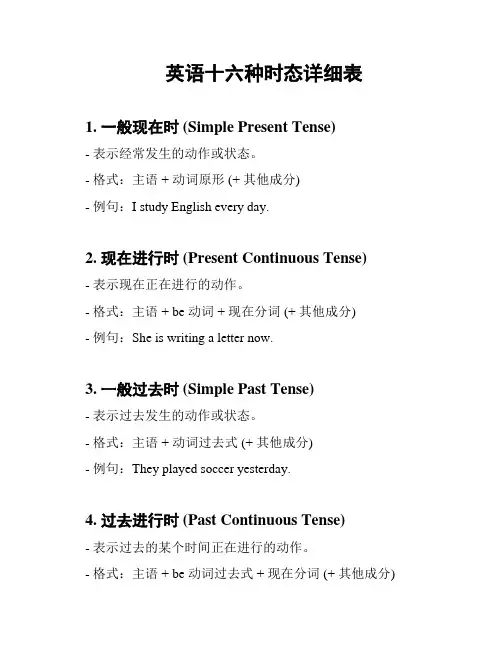
英语十六种时态详细表1. 一般现在时 (Simple Present Tense)- 表示经常发生的动作或状态。
- 格式:主语 + 动词原形 (+ 其他成分)- 例句:I study English every day.2. 现在进行时 (Present Continuous Tense)- 表示现在正在进行的动作。
- 格式:主语 + be 动词 + 现在分词 (+ 其他成分)- 例句:She is writing a letter now.3. 一般过去时 (Simple Past Tense)- 表示过去发生的动作或状态。
- 格式:主语 + 动词过去式 (+ 其他成分)- 例句:They played soccer yesterday.4. 过去进行时 (Past Continuous Tense)- 表示过去的某个时间正在进行的动作。
- 格式:主语 + be 动词过去式 + 现在分词 (+ 其他成分)- 例句:He was studying when I called him.5. 现在完成时 (Present Perfect Tense)- 表示过去发生的动作对现在产生的影响或仍然持续的动作。
- 格式:主语 + have/has + 过去分词 (+ 其他成分)- 例句:I have visited Paris.6. 过去完成时 (Past Perfect Tense)- 表示过去某个时间或动作之前发生的动作。
- 格式:主语 + had + 过去分词 (+ 其他成分)- 例句:She had already left when I arrived.7. 将来时 (Simple Future Tense)- 表示将来要发生的动作或状态。
- 格式:主语 + will/shall + 动词原形 (+ 其他成分)- 例句:We will visit our grandparents tomorrow.8. 现在完成进行时 (Present Perfect Continuous Tense)- 表示过去某个时间开始的动作一直持续到现在,并可能继续下去。
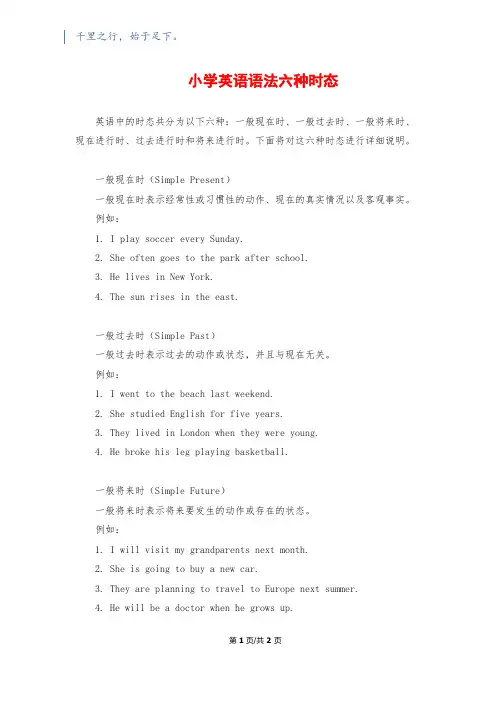
千里之行,始于足下。
小学英语语法六种时态英语中的时态共分为以下六种:一般现在时、一般过去时、一般将来时、现在进行时、过去进行时和将来进行时。
下面将对这六种时态进行详细说明。
一般现在时(Simple Present)一般现在时表示经常性或习惯性的动作、现在的真实情况以及客观事实。
例如:1. I play soccer every Sunday.2. She often goes to the park after school.3. He lives in New York.4. The sun rises in the east.一般过去时(Simple Past)一般过去时表示过去的动作或状态,并且与现在无关。
例如:1. I went to the beach last weekend.2. She studied English for five years.3. They lived in London when they were young.4. He broke his leg playing basketball.一般将来时(Simple Future)一般将来时表示将来要发生的动作或存在的状态。
例如:1. I will visit my grandparents next month.2. She is going to buy a new car.3. They are planning to travel to Europe next summer.4. He will be a doctor when he grows up.第1页/共2页锲而不舍,金石可镂。
现在进行时(Present Continuous)现在进行时表示现在正在进行或发生的动作,也可以用来表示将来安排好的动作。
例如:1. I am watching a movie right now.2. She is studying for her final exam.3. They are having dinner at a restaurant tonight.4. He is going to the park with his friends tomorrow.过去进行时(Past Continuous)过去进行时表示过去某一时间点正在进行或发生的动作。
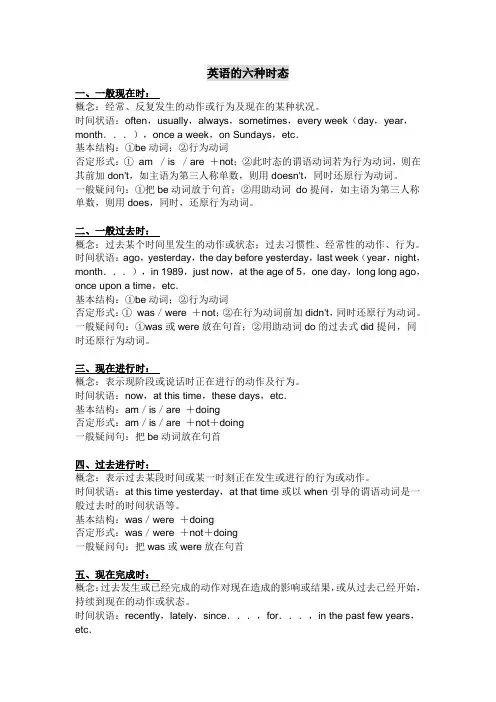
英语的六种时态一、一般现在时:概念:经常、反复发生的动作或行为及现在的某种状况。
时间状语:often,usually,always,sometimes,every week(day,year,month...),once a week,on Sundays,etc.基本结构:①be动词;②行为动词否定形式:①am /is /are +not;②此时态的谓语动词若为行为动词,则在其前加don't,如主语为第三人称单数,则用doesn't,同时还原行为动词。
一般疑问句:①把be动词放于句首;②用助动词do提问,如主语为第三人称单数,则用does,同时,还原行为动词。
二、一般过去时:概念:过去某个时间里发生的动作或状态;过去习惯性、经常性的动作、行为。
时间状语:ago,yesterday,the day before yesterday,last week(year,night,month...),in 1989,just now,at the age of 5,one day,long long ago,once upon a time,etc.基本结构:①be动词;②行为动词否定形式:①was/were +not;②在行为动词前加didn't,同时还原行为动词。
一般疑问句:①was或were放在句首;②用助动词do的过去式did提问,同时还原行为动词。
三、现在进行时:概念:表示现阶段或说话时正在进行的动作及行为。
时间状语:now,at this time,these days,etc.基本结构:am/is/are +doing否定形式:am/is/are +not+doing一般疑问句:把be动词放在句首四、过去进行时:概念:表示过去某段时间或某一时刻正在发生或进行的行为或动作。
时间状语:at this time yesterday,at that time或以when引导的谓语动词是一般过去时的时间状语等。
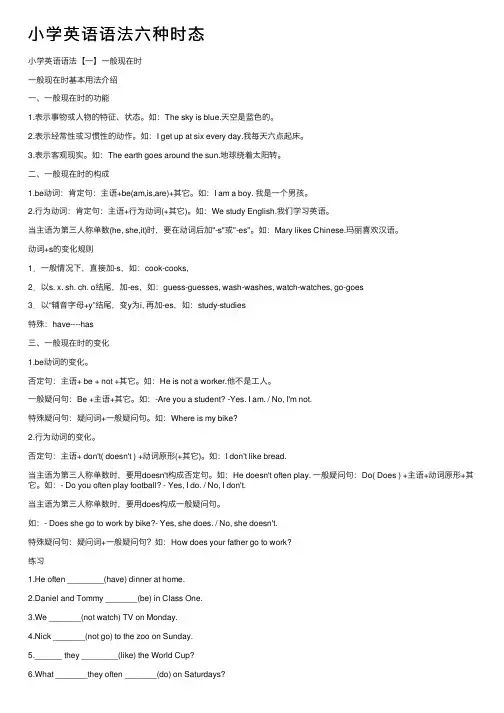
⼩学英语语法六种时态⼩学英语语法【⼀】⼀般现在时⼀般现在时基本⽤法介绍⼀、⼀般现在时的功能1.表⽰事物或⼈物的特征、状态。
如:The sky is blue.天空是蓝⾊的。
2.表⽰经常性或习惯性的动作。
如:I get up at six every day.我每天六点起床。
3.表⽰客观现实。
如:The earth goes around the sun.地球绕着太阳转。
⼆、⼀般现在时的构成1.be动词:肯定句:主语+be(am,is,are)+其它。
如:I am a boy. 我是⼀个男孩。
2.⾏为动词:肯定句:主语+⾏为动词(+其它)。
如:We study English.我们学习英语。
当主语为第三⼈称单数(he, she,it)时,要在动词后加"-s"或"-es"。
如:Mary likes Chinese.玛丽喜欢汉语。
动词+s的变化规则1.⼀般情况下,直接加-s,如:cook-cooks,2.以s. x. sh. ch. o结尾,加-es,如:guess-guesses, wash-washes, watch-watches, go-goes3.以“辅⾳字母+y”结尾,变y为i, 再加-es,如:study-studies特殊:have----has三、⼀般现在时的变化1.be动词的变化。
否定句:主语+ be + not +其它。
如:He is not a worker.他不是⼯⼈。
⼀般疑问句:Be +主语+其它。
如:-Are you a student? -Yes. I am. / No, I'm not.特殊疑问句:疑问词+⼀般疑问句。
如:Where is my bike?2.⾏为动词的变化。
否定句:主语+ don't( doesn't ) +动词原形(+其它)。
如:I don't like bread.当主语为第三⼈称单数时,要⽤doesn't构成否定句。
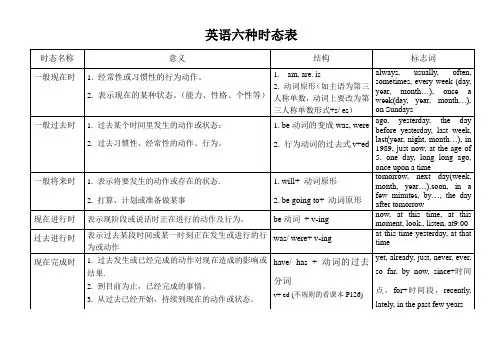
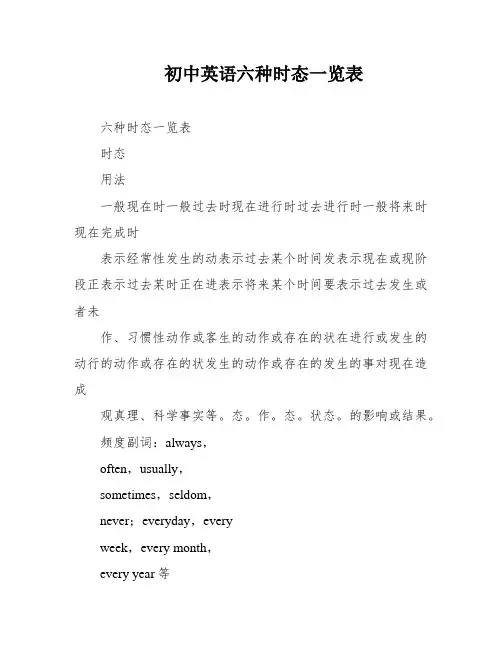
初中英语六种时态一览表六种时态一览表时态用法一般现在时一般过去时现在进行时过去进行时一般将来时现在完成时表示经常性发生的动表示过去某个时间发表示现在或现阶段正表示过去某时正在进表示将来某个时间要表示过去发生或者未作、习惯性动作或客生的动作或存在的状在进行或发生的动行的动作或存在的状发生的动作或存在的发生的事对现在造成观真理、科学事实等。
态。
作。
态。
状态。
的影响或结果。
频度副词:always,often,usually,sometimes,seldom,never;everyday,everyweek,every month,every year等thedaybefore yesterday,yesterday, last/yesterdaynight, lastweek,lastmonth, lastyear,lastterm;in/on+曩昔工夫;工夫+ago; just now, at the age of 5, one day, long long ago; once upon a timenow, at the moment, at thismoment,just now,look, listen, at present, these days, this weekjustthen,atthis momentyesterday, yesterdaymorning/ afternoon/evening,at thattime,thismorning,thewholemorning,alldayyesterday,from+时间数+to+时间数+lastnight, those days或以when, while引导的谓语动词是普通曩昔时的时间状语等。
was/were+动词的目前分词tomorrow;thedayalready, yet, just, ever, aftertomorrow;nextnever, before, for +时day/week/month/year/间段,since+时间点term;soon;inafewminutes;by+年份;in+工夫状语;inthefuture; in future工夫标记构成体式格局1.动词be(am/is/are) +表语…2.动词真相+…(主语是第三人称单数,动词也用第三人称单数)1.动词was/were+表语2.实义动词的过去式+…be(am/is/are) +动词的目前分词原形过去分词+…(shall用于第一人称) 2. be going to +动词原形疑句问型式1. Be +主语+…?2. Do/Does +主语+动词真相+…?1. Was/Were +主语+…?2. Did +主语+动词原形+…?Be+主语+动Was/Were+主语 1. Will/Shall +主语Have/Has+主语+过词的目前分词+动词的目前分词+动词真相+…?去分词+…?+…?+…?2.Be+主语+goingto+动词真相+…?1.主语+will/shall主语+ haven’t / hasn’t ++动词的目前分wasn’t (was not)/not+动词真相曩昔分词+…词+…weren’t(werenot)++…动词的目前分词2.主语+ be + not ++…goingto+动词原形+…变否1.主语+be+not1.主语+ was/were主语+ be + not主语+ +…+ not +…化定2.主语+don’t/doesn’t2.主语+ didn’t +。
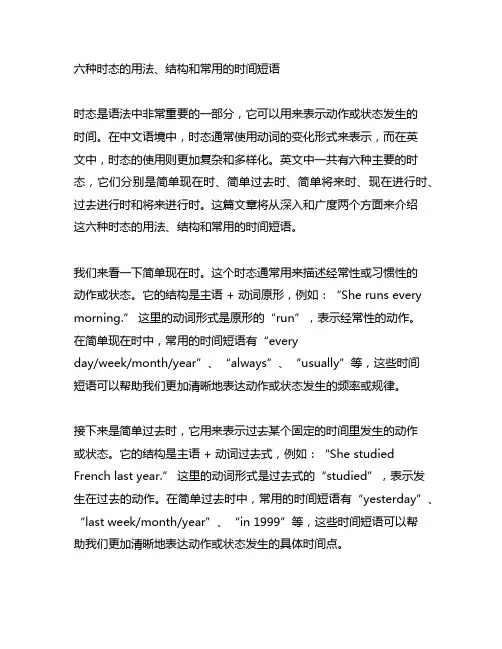
六种时态的用法、结构和常用的时间短语时态是语法中非常重要的一部分,它可以用来表示动作或状态发生的时间。
在中文语境中,时态通常使用动词的变化形式来表示,而在英文中,时态的使用则更加复杂和多样化。
英文中一共有六种主要的时态,它们分别是简单现在时、简单过去时、简单将来时、现在进行时、过去进行时和将来进行时。
这篇文章将从深入和广度两个方面来介绍这六种时态的用法、结构和常用的时间短语。
我们来看一下简单现在时。
这个时态通常用来描述经常性或习惯性的动作或状态。
它的结构是主语 + 动词原形,例如:“She runs every morning.” 这里的动词形式是原形的“run”,表示经常性的动作。
在简单现在时中,常用的时间短语有“everyday/week/month/year”、“always”、“usually”等,这些时间短语可以帮助我们更加清晰地表达动作或状态发生的频率或规律。
接下来是简单过去时,它用来表示过去某个固定的时间里发生的动作或状态。
它的结构是主语 + 动词过去式,例如:“She studied French last year.” 这里的动词形式是过去式的“studied”,表示发生在过去的动作。
在简单过去时中,常用的时间短语有“yesterday”、“last week/month/year”、“in 1999”等,这些时间短语可以帮助我们更加清晰地表达动作或状态发生的具体时间点。
第三种时态是简单将来时,它用来表示将来某个固定的时间里将要发生的动作或状态。
它的结构是主语 + will + 动词原形,例如:“She will visit her grandparents next Sunday.” 这里的动词形式是原形的“visit”,表示将来即将发生的动作。
在简单将来时中,常用的时间短语有“tomorrow”、“next week/month/year”、“in the future”等,这些时间短语可以帮助我们更加明确地表达将来动作或状态发生的时间点或范围。
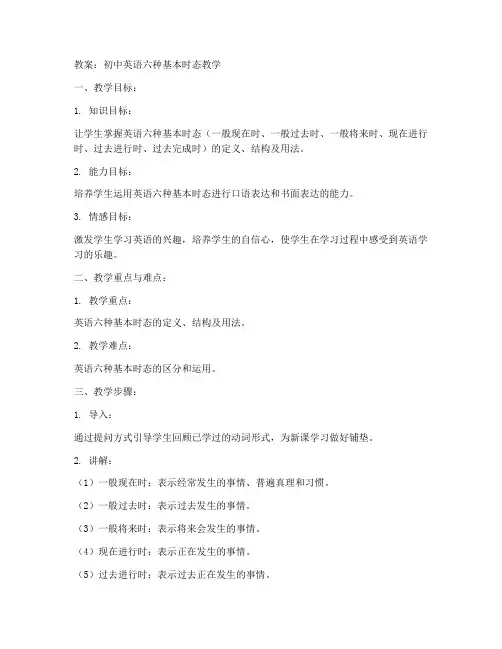
教案:初中英语六种基本时态教学一、教学目标:1. 知识目标:让学生掌握英语六种基本时态(一般现在时、一般过去时、一般将来时、现在进行时、过去进行时、过去完成时)的定义、结构及用法。
2. 能力目标:培养学生运用英语六种基本时态进行口语表达和书面表达的能力。
3. 情感目标:激发学生学习英语的兴趣,培养学生的自信心,使学生在学习过程中感受到英语学习的乐趣。
二、教学重点与难点:1. 教学重点:英语六种基本时态的定义、结构及用法。
2. 教学难点:英语六种基本时态的区分和运用。
三、教学步骤:1. 导入:通过提问方式引导学生回顾已学过的动词形式,为新课学习做好铺垫。
2. 讲解:(1)一般现在时:表示经常发生的事情、普遍真理和习惯。
(2)一般过去时:表示过去发生的事情。
(3)一般将来时:表示将来会发生的事情。
(4)现在进行时:表示正在发生的事情。
(5)过去进行时:表示过去正在发生的事情。
(6)过去完成时:表示在过去某个时间点之前已经完成的事情。
3. 练习:(1)让学生用六种基本时态分别造句,加深对时态的理解。
(2)进行时态辨析练习,提高学生对时态的运用能力。
4. 课堂活动:分组进行角色扮演,让学生在实际语境中运用六种基本时态。
5. 总结:对本节课所学内容进行总结,强调六种基本时态的用法及区分。
6. 作业布置:让学生课后用六种基本时态写一篇小短文,巩固所学知识。
四、教学反思:在教学过程中,要注意引导学生通过实际语境来感知和运用六种基本时态,提高学生的口语表达和书面表达能力。
同时,要关注学生的学习进度,及时解答学生的疑问,确保教学效果。
英语六种时态的归纳总结一、一般现在时一般现在时表示经常性、习惯性或普遍真理的动作或状态。
句中主语为第三人称单数时,动词要加-s或-es。
1. 定义一般现在时用于描述现在的动作或状态,主要有以下几种用法:- 表示经常性或习惯性动作:I usually go swimming on Sundays. (我通常在周日去游泳。
)- 表示客观事实或普遍真理:The Earth revolves around the sun. (地球绕着太阳转。
)- 表示现阶段的状态或性格特征:Tom is a student. (汤姆是一个学生。
)2. 句型- 肯定句:主语 + 动词原形(加-s或-es)- 否定句:主语 + do/does not + 动词原形- 疑问句:Do/Does + 主语 + 动词原形?3. 示例- 肯定句:He plays basketball every day. (他每天打篮球。
)- 否定句:She does not like coffee. (她不喜欢咖啡。
)- 疑问句:Do you speak English? (你会说英语吗?)二、一般过去时一般过去时表示过去发生的动作或存在过的状态。
1. 定义一般过去时用于描述过去的动作或状态,主要有以下几种用法:- 表示过去某个时间的动作:I visited my grandparents last weekend. (我上周末去看望了我的祖父母。
)- 表示过去的习惯或经常发生的动作:I used to play soccer when I was young. (我年轻时常常踢足球。
)2. 句型- 肯定句:主语 + 动词过去式- 否定句:主语 + did not + 动词原形- 疑问句:Did + 主语 + 动词原形?3. 示例- 肯定句:She painted a picture yesterday. (昨天她画了一幅画。
)- 否定句:They did not go to the party. (他们没有去参加派对。
英语语法大全之16种时态规则一、一般现在时(Simple Present Tense)1. 表示经常性或普遍性的动作、状态或喜好。
例:He eats breakfast every day.(他每天吃早餐。
)例:I like watching movies.(我喜欢看电影。
)二、现在进行时(Present Continuous Tense)1. 表示现在正在进行的动作。
例:She is studying in the library.(她正在图书馆研究。
)例:They are playing soccer in the park.(他们正在公园踢足球。
)三、一般过去时(Simple Past Tense)1. 表示过去发生的动作或状态。
例:I went to the party last night.(我昨晚去了派对。
)例:She studied English in college.(她在大学里研究英语。
)四、过去进行时(Past Continuous Tense)1. 表示过去某一时间正在进行的动作。
例:I was watching TV when she called.(她打电话时,我正在看电视。
)例:They were playing basketball yesterday afternoon.(昨天下午他们在打篮球。
)五、一般将来时(Simple Future Tense)1. 表示将来某个时间要发生的动作或状态。
例:We will have a meeting tomorrow.(我们明天有一个会议。
)例:He will visit his grandparents next week.(下周他会去探望他的祖父母。
)六、将来进行时(Future Continuous Tense)1. 表示将来某一时间将在进行的动作。
例:I will be working on my project this time next week.(下星期的这个时候我将会在做我的项目。
小学英语语法六种时态英语语法中,有六种基本的时态,包括简单现在时、简单过去时、简单将来时、现在进行时、过去进行时和将来进行时。
下面是一篇大约的关于这六个时态的说明:一、简单现在时 (Simple Present Tense)简单现在时表示经常发生的动作或事实,也用于表示现在的状态或真理。
形式:肯定句:主语 + 动词原型 + 其他否定句:主语 + do/does + not + 动词原型 + 其他疑问句:Do/Does + 主语 + 动词原型 + 其他例句:1. I live in Beijing.(我住在北京)2. She doesn't like coffee.(她不喜欢咖啡)3. Does he play basketball?(他打篮球吗?)二、简单过去时 (Simple Past Tense)简单过去时表示在过去某个时间发生的动作或状态。
形式:肯定句:主语 + 动词过去式 + 其他否定句:主语 + did + not + 动词原型 + 其他疑问句:Did + 主语 + 动词原型 + 其他第1页/共4页例句:1. We watched a movie yesterday.(我们昨天看电影了)2. He didn't go to the party.(他没去参加派对)3. Did you finish your homework?(你完成作业了吗?)三、简单将来时 (Simple Future Tense)简单将来时表示将要发生的动作或状态。
形式:肯定句:主语 + will + 动词原型 + 其他否定句:主语 + will + not + 动词原型 + 其他疑问句:Will + 主语 + 动词原型 + 其他例句:1. I will call you tomorrow.(我明天会给你打电话)2. She won't be late for the meeting.(她不会迟到参加会议)3. Will they come to the party?(他们会来参加派对吗?)四、现在进行时 (Present Continuous Tense)现在进行时表示正在进行的动作或状态。
英语十六种时态总结一、一般现在时(Simple Present Tense)一般现在时表示的是经常性或习惯性的动作、事实或状况。
它的基本结构是主语 + 动词原形(第三人称单数加s)。
例如: - I eat breakfast every day. - He plays football on weekends.二、一般过去时(Simple Past Tense)一般过去时指发生在过去某个时间的动作、事实或状况。
它的基本结构是主语+ 动词过去式。
例如: - She studied at Harvard University. - They went to the beach last summer.三、一般将来时(Simple Future Tense)一般将来时表示将来发生的动作、事实或状况。
它的基本结构是主语 + will + 动词原形。
例如: - I will visit my grandparents next month. - They will have a party on Saturday.四、现在进行时(Present Continuous Tense)现在进行时表示目前正在进行的动作或状况。
它的基本结构是主语 +am/is/are + 动词-ing。
例如: - She is studying for an exam. - They are playing basketball in the park.五、过去进行时(Past Continuous Tense)过去进行时表示在过去某个时间正在进行的动作或状况。
它的基本结构是主语+ was/were + 动词-ing。
例如: - This time last year, I was working in London. - They were watching a movie when I called.六、将来进行时(Future Continuous Tense)将来进行时表示将来某个时间正在进行的动作或状况。
1.--The bread is really delicious. --- Thank you. I _____________ it myself.A. makeB. madeC. will makeD. am making2.–Where is Jim? --Look! He ________ under the tree.A.is standingB. stoodC. standsD. stand3.Gary is the best singer in my class. No one else ________ so well.A.singsB. sangC. will singD. is singing4.Yesterday, I _____ the subway home when I suddenly found I was on the wrong line.A.tookB. was takingC. had takenD. is taking5.–It’s time to work now. ---OK. I’ll wake Carl up. He ______ for an hour.A.has fallen asleepB. has been asleepC. fell asleepD. falls asleep6.I ______ an invitation to the concert. I can’t wait to goA.receiveB. will receiveC. was receivingD. have received7.Bill likes reading. He ______ picture books with his dad every evening.A.readB. readsC. is readingD. has read8.---Is dinner ready? -- Not ________. A. already B. just C. yet D. ever9.--I can’t find my English textbook. –Is it possible that you _______ it at home?A.lostB. sawC. leftD. gave10.The film Operation Red Sea _________ a lot of praise since its first show months ago.A.winsB. winC. will winD. has won11.Michael ________ in a school in Yunnan from February to June next year.A.teachB. taughtC. will teachD. was teaching12.The earth goes___________ the sun. A. around B. through C. between D. across13.Before the sun ________ , we need to get to the top of the mountain. A. set B. sets C. is setting D. willset14.Our city is cleaner than it ________ be. A. is used to B. used to C. uses to D. is used15.–Paul, what were you doing at nine last night? --- I ________ a movie in the cinema with my friends.A.was watchingB. watchC. have watchedD. will watch16.--- Do you still play basketball? --- Oh, no. I _______ it for the past two years.A.haven’t playedB. didn’t playC. won’t play D hadn’t played17.–Lucy, is your uncle a teacher? --- Yes, he is. He _______ history for nearly 20 years.A.teachesB. has taughtC. is teachingD. will teach18.–Did you watch the basketball match on TV last night ? --I wanted to, but my father _____ his favorite TVprogram.A.watchedB. was watchingC. watchesD. is watching19.She ______ an English magazine when I came in. A. reads B. had read C. will read D. wasreading20.Sorry, I’m late. I ______ with a friend and I completely forgot the time.A.talkB. am talkingC. was talkingD. will take21.Listen! Mr. Black ______ a talk on robots in the hall. A. gives B. is giving C. will give D. gave22.–We _____ to Yun Brocade Museum with the exchange students this coming summer holiday. --- That’s amazing!A.wentB. goC. have goneD. will go23.–Jerry, have you ever been to the Great Wall? -- Yes. I _______ there with my parents last year.A.goB. wentC. will goD. have gone.24.--- I can’t find Jimmy. Where is he ? ---- He _______ in the garden at the moment.A.worksB. will workC. is workingD. work25.Mary _______ a math problem with her classmates when the math teacher knocked at the classroom door.A.has discussedB. was discussedC. was discussingD. discusses26.While Nick _______ CCTV News, someone knocked at the door.A. watchedB. was watchingC. watchD. watches27.The family ______ there since they moved to China in the 2000s. A. lived B. will live C. live D. havelived28.–Look! Somebody _______ the lights. --- Well, it wasn’t me. I didn’t do it.A.turns offB. is turning offC. was turning offD. has turned off29.While Alan was writing a letter, the children ______ outside. A. play B. were playing C. will play D. plays30.We ______ a party for Kate. It’s supposed to be a surprise. A. were having B. had C. will have D. have had31.My sister _____ the piano very well, but she hasn’t had time to play recently.A.will playB. has playC. playedD. plays32.Two months ______ a long time. We can visit our grandparents during the vacation. A. am B. is C. are D.be33.They don’t live here any longer. They _______ to Chengdu last month.A.moveB. movedC. will moveD. are moving34.More and more foreign students begin to learn Chinese, and many of them _______ Chinese better and better now.A.are spokenB. spoke C has spoken D. are speaking35.– Honey, where are you? -- I ____. Just let me put on my shoes. A. come B. came C. am coming D. havecome36.–There is someone knocking at the door. –It must be the repairman. I ____ him to come to fix our fridge two hoursago.A.callB. have calledC. calledD. was calling37.Don’t take the dictionary away. I ______ it. A. use B. used C. am using D. have used.38.I don’t k now when he ______ back. Please tell me when he _____ back.es, comesB. comes, will comeC. will come, comesD. will come, come39.The debate on whether to keep pets ______ forty minutes yesterday afternoon.stB. lastedC. will lastD. has lasted40.– How do you usually go to school? -- I _____ to school on foot. A. go B. went C. was going D. willgo41.Aunt Lucy will tell us something about her trip to Australia when she _______ back.A.cameB. comesC. would comeD. will come42.– Do you know if Jack will drive to London this weekend? -- Jack? Never! He _______ driving so far.A.has hatedB. will haveC. hatedD. hates43.--- I suppose you are at least 60 years old. --- Thank you. I’m glad you _____ that. My real age is 62.A.sayB. saidC. are sayingD. were saying44.As we all know, the Silk Road _________ China to the west in ancient times.A.connectsB. connectedC. will connectD. is connecting45.Robots ______ more heavy work for us in the future. A. will do B. did C. have done D. were doing46.Be quiet! The students _____ a physics test in the next room. A. had B. have had C. were having D. arehaving47.Julia isn’t going to the cinema with us because she ________ the film. A. sees B. saw C. will see D. has seen48.Though he _____ the book three times, he hopes to read it again. A. read B. reads C. has read D. wouldread49.Someone _____ at he door. Can you open it? A. knocks B. knocked C. is knocking D. was knocking50.Students in Class One _____ the museum next Friday. A. visited B. visit C. will visit D. are visiting51.The children will go to the zoo if it ___________________(not rain ) this Saturday.52.His son will write to me as soon as he _______________(pass) the exam.53.When I was young, my grandfather told me that the sun ______________ (rise) in the east.54.Look, the expression on his face ____________ (show) that something bad must have happened to him.55.Mr. Zhang _______________(teach) us English three years ago.56.I heard that Jim _____________(catch) a bad cold last week.57.He watched the result of the test and then ___________(draw) a conclusion.58.I don’t know if we _______________ (show) around the History Museu m tomorrow afternoon.59.Don’t worry about the rain. Father ________________(visit) the Binjiang Park as soon as the rain stops.60.There ___________ (be) a new bridge over the Changjiang River in several years.61.These days we _________________ (try) our best to get good marks in the exam.62.--- Look at the twins. – Oh, they ______________ (make) a model plane happily.63.Look!The people in the river _______________ (swim).64.Since he fell off the bike, John _______________ (lie) in bed for nearly a week.65.There ________________ (be) great changes in our country since 1979.66.Oh, dear! I ____________ (lose) my key and now I can’t go into my room.67.。